The Sydney Power 100: The 100 most powerful people, 20-1
The wait is finally over. The Daily Telegraph has spent all week counting down our ultimate list of 100 powerful figures in politics, business, sport and entertainment, and today we can finally reveal who is Sydney’s most powerful person. SEE THE COMPLETE LIST.
NSW
Don't miss out on the headlines from NSW. Followed categories will be added to My News.
The wait is finally over.
The Daily Telegraph has spent all week counting down our ultimate list of 100 powerful figures in politics, business, sport and entertainment and today we can finally reveal who is Sydney’s most powerful person.
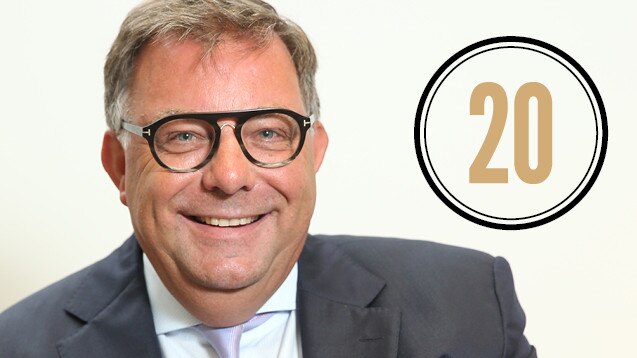
20. Michael Photios — Liberal factional powerbroker
To know of Michael Photios is to have an opinion of him.
While detractors claim Photios’s power has been fading since he was booted from the Liberal state executive given his career as a lobbyist, even they concede he continues to pull strings in the Liberal Party.
Photios was forced out in 2013 after then-prime minister Tony Abbott decreed “you can be a powerbroker or a lobbyist but you can’t be both”.
But he was on the scene at Parliament House Canberra alongside Malcolm Turnbull, who had his backing, when the prime minister was toppled last year.
While unable to save Turnbull, Photios helped to elevate Scott Morrison and keep rival contender Peter Dutton at bay.
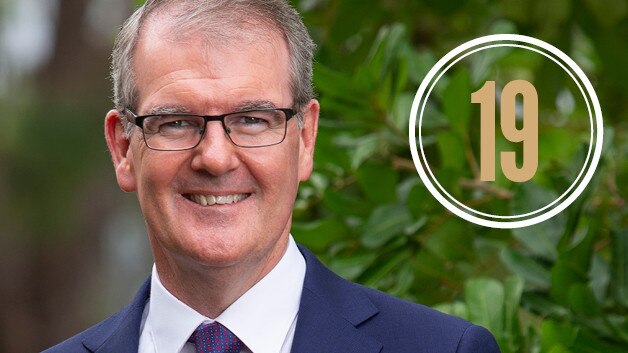
19. Michael Daley — NSW Labor Leader
There’s a salient saying on Macquarie St: the worst thing to ever happen to Premier Gladys Berejiklian was the downfall of Luke Foley.
Foley’s self-inflicted implosion led to the rise of Michael Daley and a sudden change in the prospects of the Labor Opposition.
Daley is an affable, down-to-earth Bob Carr mentee who is now in striking distance of knocking Berejiklian off her throne and becoming the leader of NSW.
The 53-year-old has overseen the party’s startling recovery since the Foley groping scandal, focusing on core ALP concerns in health and education, tearing up the government’s stadiums strategy, winding back development and amending the state’s transport blueprint to the benefit of Western Sydney at the expense of the northern beaches.
In contrast to Foley, Daley is a better media performer, adept at the cut-through grab and ever ready to remind voters of his humble beginnings as a paperboy from a battling Maroubra family.
He now finds himself in with a fighting chance of becoming the 46th premier of the state.
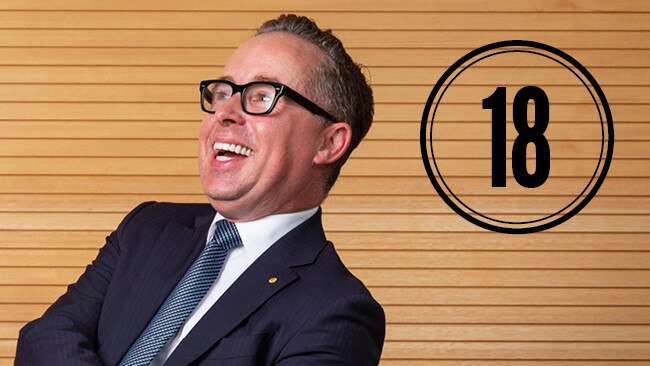
18. Alan Joyce — Qantas CEO
There’s something a little plastic-looking about Alan Joyce.
At results announcements his manner is robotic, his diction slow and deliberate to help journos struggling to decipher the Dublin accent.
He looks a little shiny and in picture shoots his thousand-watt smile is seemingly frozen to his face.
Then came marriage equality.
The gay Qantas CEO, who made the biggest personal donation to the yes campaign of $1 million, suddenly looked more animated, passionate and relatable.
With the comfort of a balance sheet in rude health and a brand the public loves (if only there were more cheap seats and better frequent flyer kickbacks), Joyce galvanised every aspect of his soaring power base to take on the likes of Peter “stick to your knitting” Dutton.
And he makes no apologies for it.
“I figure that I am the custodian of this amazing brand that goes back 98 years and it does have a tagline ‘the spirit of Australia’.
“I obviously thought, and the company thought, what is more in the spirit of Australia than a fair go.
“I love that expression, I think that’s what sums up Australians for me and a fair go is what marriage equality is all about,” Joyce says.
He believes this powerful combination helped secure the Yes vote.
“I don’t think it would have made any difference if somebody else was out there supporting marriage equality that didn’t have this amazing brand behind them. That’s what got people’s attention.”
The Qantas brand used to be considered like an unfashionable chardonnay, “appealing to the older generations”, and the Yes campaign helped to win the hearts and minds of a younger generation.
“We are seen as an egalitarian company. If an Irishman who is gay can become CEO, anyone can become CEO and it’s all on merit.”
The journey for Joyce, 52, to go public with a very personal campaign came at the close of a rollercoaster decade as boss of the national carrier.
In 2011 he was the most hated CEO in Australia after he grounded the airline during a bitter industrial dispute.
Many wanted him sacked when the airline plunged $2.8 billion into the red in 2014.
Since then he has led the corporation through a massive restructure, driving the share price from a low of $1.03 to a high of $6.92 in five years.
For the record, there’s nothing plastic about Joyce in person.
He’s warm and engaging and seems like a great bloke.
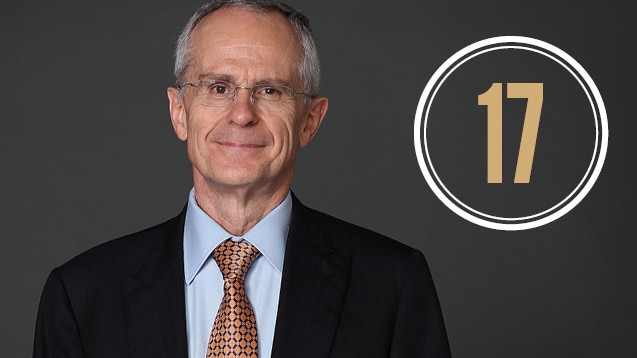
17. Rod Sims — Australian Competition and Consumer Commission Chairman
One regulator who emerged from the banking royal commission with his reputation enhanced was Rod Sims.
The Australian Competition and Consumer Commission chief’s tough line on enforcing consumer law and taking on big companies attracted the praise of Royal Commissioner Kenneth Hayne, who contrasted it with the limp response of rival regulators such as the Australian Securities and Investments Commission when it came to the banks.
Sims was first appointed ACCC boss by Labor in 2011 and has since been reappointed by the Coalition — a first for the position and a testament to his reputation of going into bat for ordinary Australians as the nation’s consumer cop.
He has campaigned for tougher penalties for companies, sued the major supermarkets for unconscionable conduct toward suppliers, hammered the telcos over dodgy contracts and internet speeds, and brokered a deal allowing real-time information about petrol prices to be supplied to consumers through mobile phone apps.
He has also won high profile anti-cartel cases resulting in multimillion-dollar fines.
Most recently the cricket-loving Sydneysider has signalled his willingness to take on online giants Google and Facebook, armed with new powers to hit multinational companies with fines worth hundreds of millions of dollars.
In November consumer law penalties were increased from up to $1.1 million per breach to up to $10 million per breach — or 10 per cent of annual turnover in the preceding 12 months.
“The good news for consumers is companies are going to have to take them a lot more seriously and look after their customers a lot better — because the penalties for not doing so are going up massively,” Mr Sims says.
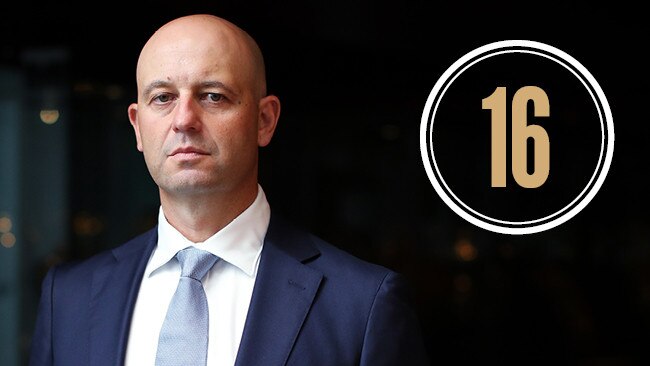
16. Todd Greenberg — NRL CEO
A glass of wine with his next door neighbour helps Todd Greenberg put into perspective his role as NRL chief executive.
“I understand the big onus on my shoulders to protect and grow the game,” Greenberg says. “I take that responsibility seriously but I’m conscious we are a sport. My next door neighbour is a head of cardiac surgery at St George Hospital.
“When he and I sit down on a Friday night and have a glass of wine reflecting on our weeks, he will want to talk to me about all the challenges I’ve had because he has read about them in the paper.
“I’m interested in talking to him about the challenges he has had.
“He is saving lives. Yes we have a big responsibility but there is a guy who you need to reflect on and benchmark against. When you understand that you don’t take it too seriously.
“He is the one with real pressure.”
Greenberg is no stranger to public scrutiny. He has handed down severe salary cap penalties, dealt with an investigation into match fixing, negotiated the biggest broadcast deal in NRL history and been confronted with arguably the worst period of off-field behaviour in years.
Most days he will be at the NRL’s Moore Park headquarters by 6am, and will head out for a run around Centennial Park to set up for the day. He has a three-pronged plan to deal with the long hours and stress of the job.
“Always spend time with your own family because they are the people who will tell you the truth always. Be physically active and healthy — exercise and good diet is big for me. And three is get good sleep.”
Before joining the NRL as head of football in 2013 he was boss of the Bulldogs.
Greenberg has long been touted as a potential target for rival sporting codes but the 47-year-old says he has no intention of walking away yet.
“I can have a day when I’m sitting with the Premier, where I’m talking about $2 billion of stadium investment and I can walk outside Parliament House and get stopped by a punter who wants to talk to me about judiciary and referees,” Greenberg says.
“There are not many vocations in life where you can have that level of diversity.
“My leadership style is about doing what’s right, surrounding yourself with good people and giving them enough rope to do the things they need to do.
“This is a big game and it’s a big set of responsibilities. I’ve got a lot I want to achieve in rugby league. I’ve said for a long time the game needs a consistency of leadership.
“Our biggest challenges come from within.”
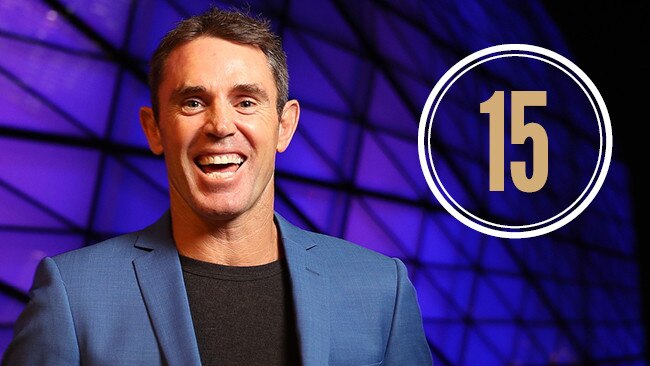
15. Brad Fittler — Origin Blues Coach
NSW had its back to the wall and there seemed no end to the pain.
The Blues had been dominated by arch rivals Queensland in State of Origin since 2006.
Up until 2017, the Maroons had won a staggering 11 out of 12 series. Some even suggested their utter domination was a threat to the future rugby league’s greatest showpiece.
Disenfranchised NSW Origin fans were fed up. Enter league legend Brad Fittler, the loveable larrikin turned NSW saviour.
His unconventional approach to coaching — from players doing yoga to walking barefoot on the grass — not only helped deliver the Origin shield back to NSW but was a beacon of hope to long suffering fans.
Fittler knew his quirky tactics would raise eyebrows but he backed himself.
“All the things we did in training I had done when I coached Lebanon in the World Cup — they worked and they were things I believed in,” he says.
“A lot of people have ideals and ways of doing things and don’t get to test them. The ideals I took into the Lebanon camp had an impression and that gave me the belief I needed to take them back to NSW and back myself.”
Fittler, who is also part of Channel 9’s commentary team, isn’t always aware of the power and influence he possesses.
While he might be conscious of the power he wields, he is very sure about what it takes to be a good leader.
“It’s all about being a good listener. It’s important to realise you don’t know everything,” he said.
“You also can’t be a good leader if you don’t have a good team around you. They need to be just as invested as you are. You need to have good people around you and you need to be able to trust the people around you.”
The people around Fittler find his aura and his pull irresistible. He knows how easily people can be sucked into his orbit. It’s one of his many unique qualities.
“I wake up every day happy and positive. I think people are drawn to that positive energy. And I’m involved in things that I love. The things I’m doing at the moment are things I believe in and people gravitate towards those that are sincere in that way.”
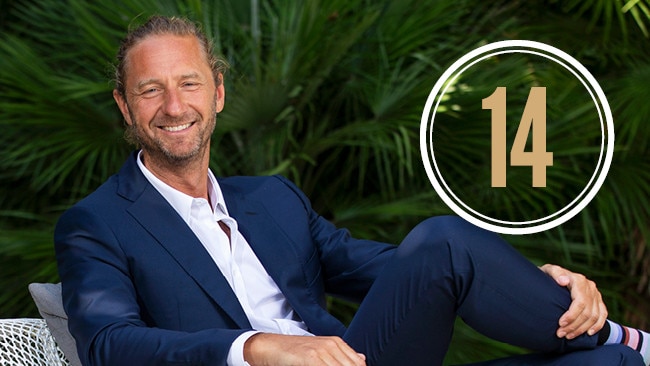
14. Justin Hemmes — Merivale CEO
The bar tsar who has ripped up sticky carpet in pubs across Sydney and given them the Merivale makeover is regularly asked when he will take his winning formula interstate or overseas.
But in splashing $80 million on a big Sydney city office block next to his Ivy hospitality hotspot, Justin Hemmes has put paid to that question for now.
When he built the eight-storey Ivy in the centre of the CBD more than a decade ago it was the city’s most expensive hospitality development at $150 million.
Now he’s doubling down on the amalgamated site of 3500 sqm, and will demolish the original Ivy and transform it into a 50-ish storey avant-garde office, entertainment, hospitality and hotel blockbuster worth tens times the original Ivy at $1.5 billion.
“I want this to be a legacy that I leave, and really boost Sydney and take it to the next level,” Hemmes says.
The amalgamated Ivy site, with its generous 100m of George St frontage, sets him up nicely to get rid of the retail outlets and reactivate those shops with pop-up bars and restaurants facing the revamped Wynyard station and the 2020-completion light rail and pedestrian boulevard.
It also puts him in the market to partner with a developer for the first time and is a radical change of pace from transforming old pubs into hip and happening venues from Bondi and Coogee to Collaroy, Newport and Enmore.
It’s testament to the strength of his network and his status in this town that doors open for him.
Among his mates are Seven director and property player Bruce McWilliam, outgoing Virgin boss John Borghetti, investment banker Chris Knowblanche and boss of developer Built, Marco Rossi.
He is close to John Symond, whose nephew James Symond, along with Seven media heir Ryan Stokes, are among Hemmes’ oldest and closest friends.
“Sydney people like success, they want people to be successful. They like to see you succeed.”
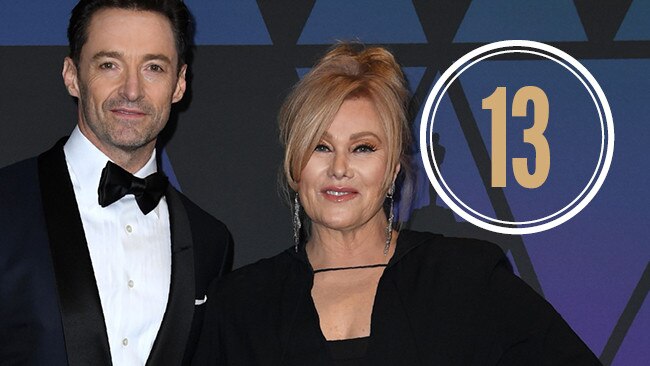
13. Hugh Jackman and Deborra-Lee Furness Furness — Actors
The ultimate Aussie acting power couple Hugh Jackman and Deborra-Lee Furness have come a long way since he was the sexiest man in tights as Gaston in Beauty and The Beast in Sydney’s theatreland and she was a jobbing actor.
One of the best-liked couples in Hollywood, both have retained their down-to-earth charm — and their authenticity and self-deprecation has won fans globally.
While the Wolverine movies sent his profile soaring, the Academy Award-nominated and Golden Globe-winning Jackman is one of the world’s most bankable stars with musical The Greatest Showman grossing more than $615m since its release last year.
It’s hard to think who else could have carried it.
But it is the couple’s commitment to each other and to family which softens the hardest hearts, as well as their philanthropic work.
He credits his wife with, well, just about everything.
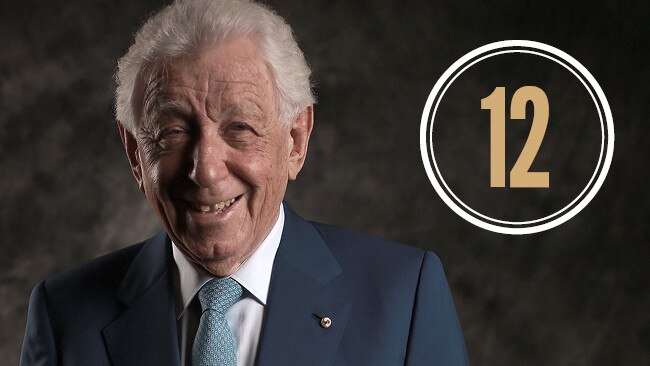
12. Lowy family — Entrepreneurs
Imagine the queue outside Frank Lowy’s office when he sold out of Westfield for $32.7 billion.
What will he and sons David, Peter and Steven do with all that cash?
Unlike in the days at Westfield when everything had to be reported to the stock exchange, the Lowys are enjoying life out of the spotlight.
There might be more time for Frank to go to the soccer, David to pilot planes and play in a band, Peter to do stand-up comedy and Steven to put his feet up after 31 years running Westfield.
But there’s always another deal to do and idea to invest in.
David is running the family investment vehicle, the Lowy Family Group and Frank is chairman. LFG had about $4 billion in assets before the sale and is heavily tied up with ex-UBS banker Shane Finemore’s New York-based investment fund Manikay.
Finemore is a legend among investment bankers, likes short selling stocks and says he doesn’t need computer-generated algorithms for investment decisions: “I make money studying natural stupidity.”
Finemore’s Manikay owns, among other things, a big slice of the Tel Aviv stock exchange.
The family also has extensive philanthropic interests, evident in the foreign affairs think-tank the Lowy Institute and the Lowy Medical Research Institute.
Frank Lowy also served as the chairman of the Football Federation of Australia from 2003-2015 and is credited with transforming the sport of soccer in Australia by creating the “A-League” competition. All this from humble beginnings.
Born in Czechoslovakia to Jewish parents in 1930, Frank Lowy lived in Hungary during World War II, when his father was taken by the Nazis and tragically murdered during the Holocaust. He moved to Australia in 1952.
In 1953 he met fellow Holocaust survivor John Saunders and they started Westfield in Blacktown in 1953.
The Lowys may no longer control Westfield but the name that started an international shopping empire lives on.
New French owners Unibail-Rodamco are rebranding their existing international property portfolio to Westfield.
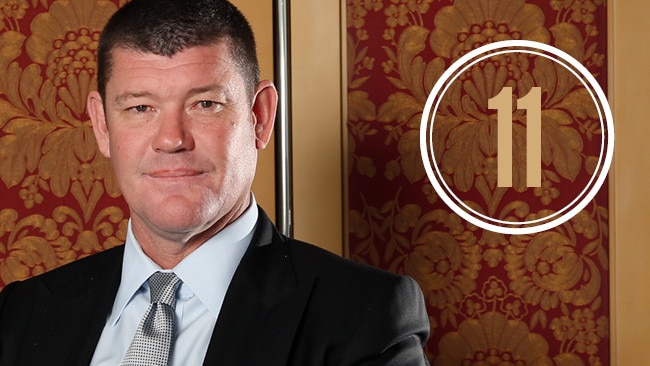
11. James Packer, Gretel and Ros — Businessman and philanthropists
Four generations of Packers have Sydney in their DNA. And Sydney would simply not be the same without the indelible impact of Sir Frank, his son Kerry, his wife Ros and the couple’s children James and Gretel.
Sir Frank began the Packer’s media dynasty with Australian Consolidated Press and the Nine Network, Kerry extended it and James ended it, tethering the family fortune instead to what his father did for fun — gaming and casinos through the Crown empire.
James is living the US and is no longer chairman, nor a director, of Crown, but his legacy project Crown Barangaroo will lure him back.
He is building his own apartment in the 75-storey luxury hotel and gaming tower, which is two years away from completion.
So far about $900 million of the $2.2 billion project budget has been spent, with the podium complete and the elevator tower done to level 28.
His mother Ros — who recently celebrated her 80th birthday with an elegant soiree at Chiswick — has long been a rock solid supporter of the arts and has a lifelong dedication to charity and philanthropic work.
Led by Gretel, the Packers have doubled-down on their exceptional generosity and in 2014 announced a $200 million philanthropic fund to support projects in education, arts, social cohesion and health.
The fund has 120 project partners and has paid for 99 patients of St Vincent’s Hospital in Darlinghurst to have a heart or lung transplant. Indigenous and arts programs each get $100 million.
James’s ex-wife Erica is raising the couple’s three children away from the spotlight of the Aussie public in Los Angeles but Crown Sydney’s completion in two years will no doubt mean more time in Sydney for them in future.
Meanwhile Gretel’s daughter Francesca is making a splash on the social scene in Sydney.
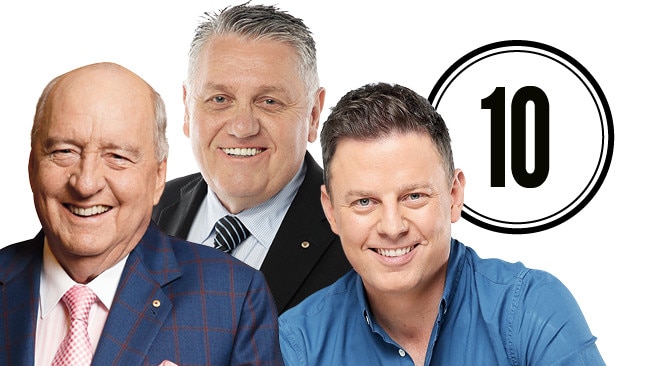
10. Talkback Titans
Veteran broadcaster Alan Jones has been a kingmaker of Australian politics and set the daily news agenda for the past 18 years.
When combined with fellow 2GB broadcasters Ray Hadley and Ben Fordham, Jones and 2GB own and influence the radio audience throughout the day.
Together they smash the ratings in their respective timeslots month after month — owning a whopping 14.1 per cent of the available audience.
It is power and reach that keeps politicians coming back for more no matter how badly they are insulted. Love them or loathe them it is hard not to listen.
Jones has also been known to invite cabinet ministers to his salubrious apartment in the “Toaster” at Circular Quay, where he loudly voices his opinions on their policies and performance.
“Better to cop a spray there than on the air,” one recipient told The Daily Telegraph.
But the order may be changing. At 77 years old and with a chronic back problem that has seen him hospitalised more than once, critics says Jones’ time is almost up.
His contract with Macquarie Media is up for renegotiation over the next five months and Jones has been under a bit of a cloud.
The wealthy Wagner family successfully sued him and the broadcaster for defamatory comments he made about the Lockyer Valley floods in 2011.
Then he had to apologise to Sydney Opera House boss Louise Herron after lambasting her for resisting moves to screen the barrier draw for The Everest horse race on the building’s iconic sails.
But Jones is a money spinner for the radio station and continues to draw a huge audience. Every one of whom is a voter in the coming elections.
Jones has won the all-important breakfast timeslot for more than 100 consecutive surveys.
That is a lot of power and a lot of influence. Dismiss him, Haldley or Fordham at your peril.
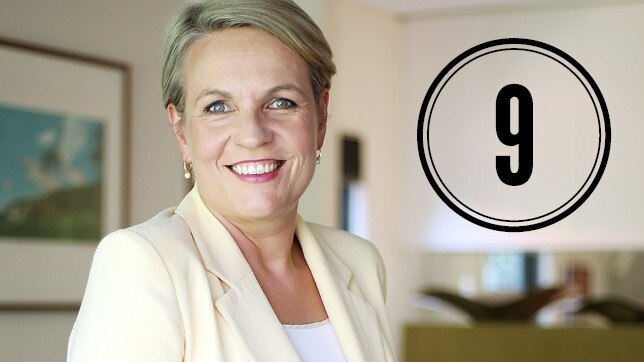
9. Tanya Plibersek — Federal Labor Deputy Leader
If the polls are right Tanya Plibersek is about to become the most influential female politician in the country.
After five years as deputy Opposition Leader she has shown that she might just have what it takes to become Australia’s most powerful female politician.
Plibersek has mastered two golden attributes all politicians crave — compassion and empathy. Her opponents have told The Daily Telegraph they shy away from taking on her hot-button issues out of a fear she’ll wipe the floor with them.
For this reason, unlike former prime minister Julia Gillard, the public is unlikely to ever ask who the real Tanya is, and she doesn’t come across as materialistic like Julie Bishop.
The girl from Oyster Bay joined the Labor Party when she was 15.
After studying journalism she ditched plans of a career in the media to work for Left faction convener Bruce Childs.
Plibersek was elected to the seat of Sydney in 1998 and it’s widely considered that her personal profile is what staves off any Greens threat.
Despite not being considered a numbers woman in the Left faction, she has used her political nous to position herself to secure senior roles within the parliamentary party.
Her leftie predilections are considered a strong asset as a future Shorten government would no doubt have to cut deals with the Greens in order to push through its legislative agenda.
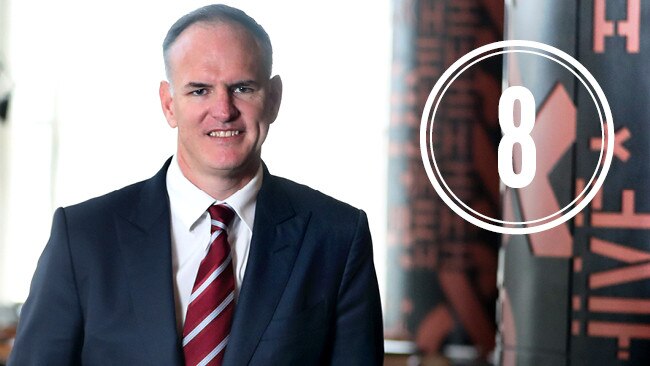
8. Michael Miller — News Corp Australia Executive Chairman Australasia
Michael Miller is Rupert Murdoch’s most powerful executive in Australia.
As executive chairman Australasia of News Corp Australia, Miller presides over more than 140 mastheads, including Sydney’s leading metropolitan The Daily Telegraph, prestige publications such as Vogue and GQ and the No. 1 online Australian news site, news.com.au.
In the chair since 2015, Miller has expanded the company’s growth operations into gaming, acquiring punters.com.au and racenet.com.au and boosted its stake in the content marketing agency and publisher Medium Rare, which produces the Qantas magazine.
The bosses of Foxtel and Sky News report to Miller and he sits on the boards of REA, Foxtel, Fox Sports, Unruly and Sky News.
At News he has focused investments on future-proofing the business with new Foxtel streaming services including sport-offering Kayo, sold two homes magazines and the Sunday Times in Perth, acquired Sky News and Australian Regional Media and driven digital subscriptions.
He is a critical advocate in the battle for a better deal for media organisations — which invest heavily in the journalism that produces trusted content — with the tech giants and a fierce critic of news aggregators who steal content online for profit.
“To work for News, by definition, means a love of journalism is at your core, regardless of whether you’re in sales, marketing or as a senior executive,” Miller says.
“We are a company of storytellers, driven by passion and commitment — our business celebrates the unsung heroes in our communities and champions for change on behalf of all Australians.”
The News Corp lifer took time out of the organisation to run APN, turning it around and helping prove his stripes for the top job at News.
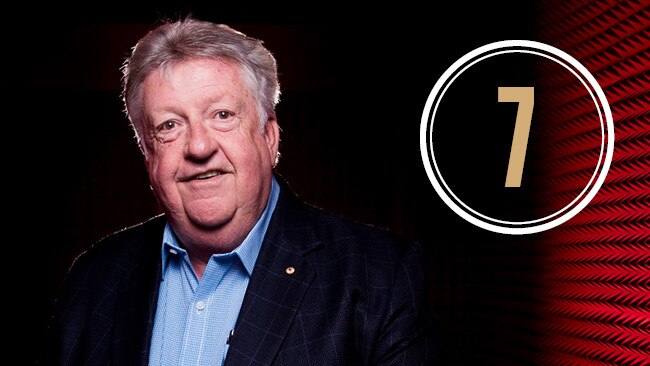
7. Denis Handlin — Sony Music Entertainment Chairman & CEO, ANZ & President, Asia
Denis Handlin can still recite the catalogue number for Simon and Garfunkel’s Bridge Over Troubled Water.
The avid teen music fan landed his first job in the industry at the Australian Record Company in 1970.
He had to fulfil record orders, identifying the requested albums stacked in the warehouse racks by the tiny printed catalogue numbers on their spine.
Within a couple of years the young man, who as a child had hosted an imaginary radio station under his parent’s house, scored his dream job as a promotions manager, taking new records to radio stations in the hope they would give them a spin.
“I saw the opportunity to make a career out of a hobby,” he says.
Almost 50 years after his first music gig, Handlin is now one of Australia’s most powerful and influential tastemakers as the Chairman & CEO of Sony Music Entertainment for ANZ and president of the label’s Asia divisions.
Since he took the reins of the multinational label, it has changed its name five times and LP records became CDs, then digital downloads and now streams and videos.
One of his favourite bands, Midnight Oil, conquered the world.
He signed teenagers Delta Goodrem and Jessica Mauboy and has been steadfast behind heritage from John Farnham to Daryl Braithwaite, and is breeding a new generation including Gang of Youth and Amy Shark.
He couldn’t tell you how many tequila shots or excellent wines he’s downed with Foo Fighters and P! nk.
But for all the glory days, the formidable music man is still focused on strengthening his local roster of hitmakers and launching them on the global stage.
He regularly hosts meetings with Sony’s interns to keep tabs on buzzing trends and has established an internal content creation division to feed fans’ insatiable appetite for videos.
“More than ever before, we have to be curators and caretakers of an artist’s career and livelihood and that is a responsibility I have never taken for granted,” he says.
“Writing songs is a gift but it’s hard work and artists need support to be able to do that work.”
Handlin is also passionately committed to the Sony Foundation he helped established 20 years ago to fund holiday camps for disadvantaged and disabled youth.
Its You Can initiative is building hospital wards for young adult cancer sufferers.
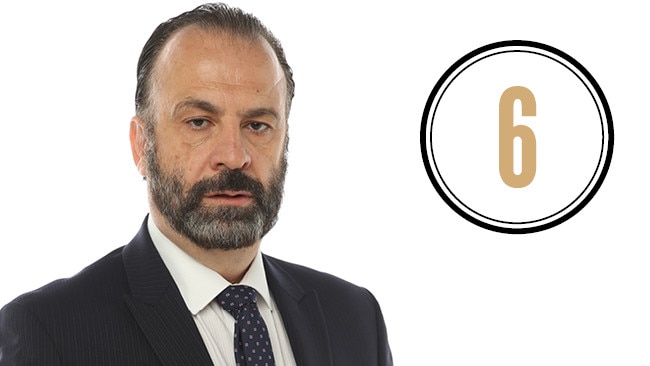
6. Peter V’landys — Racing NSW CEO
Few Sydneysiders are better connected than Peter V’landys.
On race days at Royal Randwick the Racing NSW boss can be seen introducing politicians to business leaders, celebrities to media moguls and charity chiefs to royalty.
“They say a good CEO should renew themselves every five years but I disagree,” says V’landys, who has been in his current role for 14 years.
“I believe the value of a good CEO is the value of the relationships they have built up over time,” he says. “I have used those connections to help thousands of people in all sorts of ways.”
He cites an example of meeting former Federal Agriculture Minister Peter McGauran at the races in 2007. Weeks later the industry was crippled by equine influenza.
“The bloke I had to call for help was Peter McGauran,” V’landys says. “He set up a meeting with Prime Minister John Howard and the assistance went up from $5 million to $235 million. That saved our industry.”
Thoroughbred racing attracts people from all walks of life. Stand next to V’landys at Royal Randwick and you’re likely to rub shoulders with ordinary punters as well as the rich and powerful.
“Where I scored is that I treat everyone the same, no matter who they are. They could be the richest person in business or someone who drives a garbage truck — I treat them exactly the same. And you know people respect that.”
V’landys, a happily married father of three young children, sometimes sits and pinches himself and a little voice inside his head asks “how on earth did you get here?”
“I came from a very poor family in Wollongong,” he says.
“My dad was a steelworker who worked 18 hour days. He was a labourer and would work what they called ‘doublers’ to get enough money to look after us.
“He would start at 6am and then when his shift finished at 3pm he would do another shift through to midnight,” he says. “The next day he would go back and do it all again.”
“When you come from that sort of background you realise there is no difference between people and they all need to be treated the same.”
His tenure at the helm of Racing NSW has seen V’landys bring racing in this state into the 21st Century and onto the world stage. Ruffling a few feathers on the way.
Winning the battle for wagering taxation parity has seen millions of dollars poured back into racing, helping jockeys, trainers and breeders right across the industry and breathing new life into country racing.
In just two years since Racing NSW introduced The Everest, with its $13 million in prize money, it has attracted global attention as the richest race on turf in the world.
It has also introduced a new generation to the sport, with 82 per cent of the 40,000-strong crowd under the age of 35.
There was also plenty of controversy when he fought, and won, to get the barrier draw screened on the sails of The Opera House.
However his name is mud in Victoria. V’landys decision to run the new $7.5 million Golden Eagle race at Rosehill at the start of Melbourne Cup week on Derby Day has prompted howls of outrage from the Victorian Racing Club.
V’landys has never been one to pull back from a fight. He likened the VRC reaction to a Victorian florist insisting that no NSW florist could sell roses on Valentine’s Day.
“NSW needs to stand up and have its own events and not be subservient to Victoria,” he said. Fighting talk from a man with the interests of NSW at his heart.
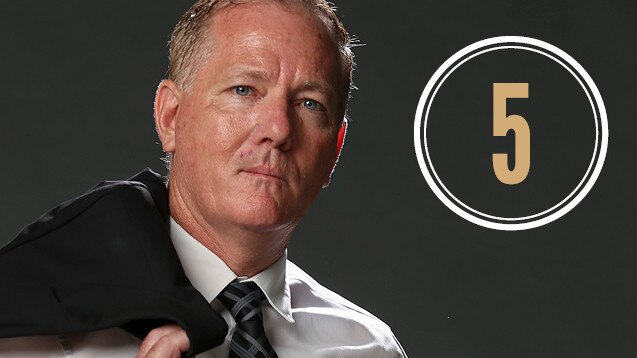
5. Mick Fuller — Police Commissioner
At a recent local police fundraiser Scott Morrison recounted how it was not unknown for his neighbour NSW Police Commissioner Mick Fuller to ask him to keep an eye on his mail or take his garbage out when he was on holidays.
The anecdote shows the reach of Fuller, who got the top job ahead of five deputies when he was an assistant commissioner, which many observers say can be attributed as much to his political and social network as his police career.
If a politician gets a speeding fine or a celebrity is caught drink driving, Fuller will know about it.
If a high profile murder case is about to be solved or an international drug bust is about to go down, he knows about it.
If a terror attack is planned against Sydney or anywhere in the country, he is fully briefed on it.
Fuller is the keeper of more secrets than probably anyone else in NSW.
The 21,000-strong workforce he is in charge of is one of the countries biggest, along with a budget of $4 billion dollars.
The 50-year-old established close links with the current state government as corporate spokesman against domestic violence working with Liberal MP Prue Goward.
Another powerful behind-the-scenes supporter is former News Corp CEO John Hartigan, who backed his appointment to commissioner.
The fact the prime minister, the premier and high flying media and business leaders attended a dinner for the local Surry Hills police station was very much because of Fuller’s influence.
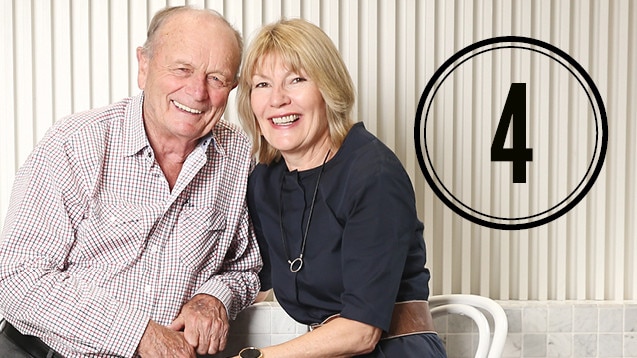
4. Katie Page and Gerry Harvey — Harvey Norman CEO and Executive Chairman
Harvey Norman CEO Katie Page points to a $799 Dolce & Gabbana kettle in the Auburn flagship store and says, “Gerry wants to know who is going to pay $799 for a kettle?
“But I love the design of it. We disagree on most things.”
The kettle defines the difference that has helped make Page and husband Gerry Harvey Sydney’s most influential power couple.
Harvey Norman now employs directly, or indirectly through its franchisees, 20,000 people in eight countries, and reported aggregated sales totalling almost $7.6 billion last year including the franchise stores.
“We work towards the same direction but see things quite differently and over time we have recognised that he is better at this and I am better at that and together it is a pretty powerful combination,” Page says.
She loves working closely with her husband.
“It can get pretty lonely, you have to make difficult decisions but we get to talk to each other.”
However she warns their conversations can become pretty robust.
“You can see the room clear pretty quickly when Katie and Gerry are having a disagreement,” she says.
Gerry Harvey believes in leading by example.
“If you can create a culture within your organisation where integrity and fairness and caring about people are important then that permeates throughout the organisation,” he says.
The sheer scale of the Harvey Norman business means it has a great deal of power and influence in the communities where it operates. Page believes that can be harnessed as a power for good.
“We believe in sport being the best thing for communities and have been investing in sport for decades.”
What she realised years ago was that there was a great deal of male sport being broadcast but little attention being paid to women athletes in any code.
“It was only catering for half of our customers not all of them. We were able to use our influence and get sponsorship dollars to women and girls and to talk to broadcasters about how much time they were going to give women’s sport on TV.”
The result has seen a slow pick-up that has snowballed to see widespread coverage of women’s sport in recent years.
“Look at the talented women commentating on sport as well now,” Page says.
“That is about using your power and influence for the good of your community which is actually your country, Australia.
“We did it on our own, we didn’t need some government body to tell us what to do, we just went and did it in the best way that met our values.”
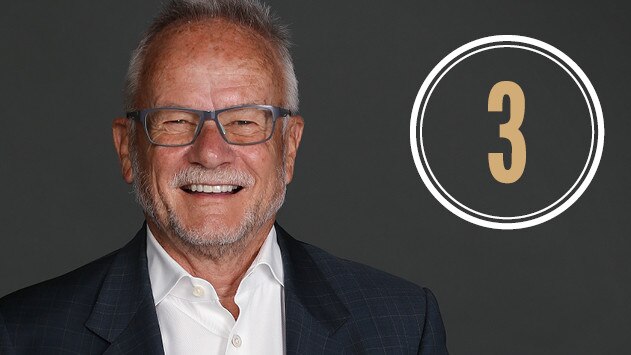
3. Tony Shepherd — Businessman
So impeccable are Tony Shepherd’s connections his government relations experts were redundant when he was recently flogging his audacious $2.4 billion bid to take over GrainCorp.
Doors to the ministerial suites of parliament are open to him without the need for paid experts by his side.
The GrainCorp play was the first bid from his little-known consortium Long-Term Asset Partners and leaves no doubt Shepherd, who turns 75 this year, is very much in the game.
He’s a former Business Council of Australia boss and former prime minister Tony Abbott’s Commission of Audit chairman.
He has a unique ability to cut through and articulate complex problems in the most simple terms, with grace and good manners.
His wife Maryanne Graham gives him a run for his money on Sydney mover and shaker stakes and is general manager of corporate affairs at Western Sydney Airport.
Shepherd’s influence is not limited to business and politics — he holds the most powerful chairmanship in sport in this town, top of the table at the Sydney Cricket Ground Trust.
In picking Sydney Airports ex-boss Kerrie Mather as his new CEO at the Trust, Shepherd has also anointed her one of Sydney’s most influential executives.
Shepherd is also chair of Greater Western Sydney Giants AFL team and is mad on driving souped-up cars and listening to chamber music.
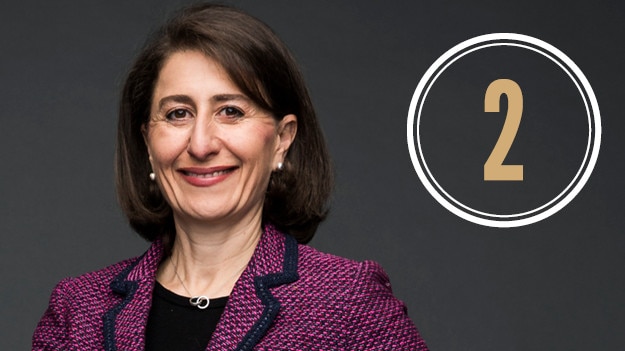
2. Gladys Berejiklian — NSW Premier
Gladys Berejiklian stands apart from most politicians in one simple characteristic — it is almost impossible to find a colleague who doesn’t like her.
When she turned her back on a career as a Commonwealth Bank executive to run in the seat of Willoughby in 2003, few predicted she would rise to become the state’s first female conservative Premier.
If she leads the Coalition to a win next month, she will become the first popularly elected female Premier.
As a minister in transport and treasury and now as Premier, Berejiklian is known for being conciliatory and managing negotiations in such a way that everyone around her feels like a winner.
She’s been labelled weak and slow are a result in some major political debates, and yet few would argue that she is insincere in seeking to build consensus in advancing her political goals.
At the same time, Berejiklian is willing to weather headwinds when she believes in an idea and has fought battles over issues such as promoting NSW’s biggest race day on the sails of the Opera House.
“A good leader is not afraid to do things their way. You have to be able to stand firm and stay true to your values,” she says.
Berejiklian’s parents are Armenian immigrants who fought her whole life to see her educated.
She attributes her work ethic, for which she is famous, to this life.
Berejiklian, a member of the Liberals’ dominant moderate faction, came to the premiership after Mike Baird resigned in 2017, after serving in the crucial portfolios of transport and treasury.
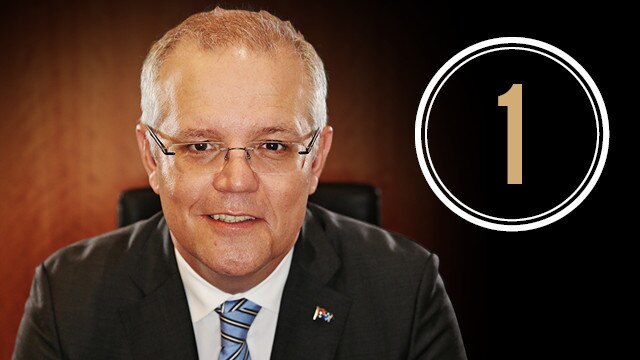
1. Scott Morrison — Prime Minister
Even with the constraints of the Westminster system and its separation of powers, the Prime Minister must be the first entry in a catalogue of individual influence and authority in Australia.
So it is for Scott Morrison, even if he does occupy the position at a time when the PM’s capacity to control the political agenda has been diminished.
Seeing your government reduced to minority status thanks to defectors and an unwanted by-election created by your predecessor will do that.
But Morrison is not one to dwell on what might have been. Throughout his political career, he has forged a reputation as a problem fixer, a pragmatist who focuses on dealing with the issue at hand rather than playing popularity games.
In Immigration, it was border security; in Social Services, it was welfare reform; and as Treasurer, it was the slow process of budget repair.
His colleagues made him Prime Minister because they were looking to solve the biggest problem of all: how to heal a divided Liberal Party and pull off an unlikely election victory.
It helped that in his career Morrison has managed to walk a blurred line between the moderate and conservative factions while earning few obvious scars.
So far as PM he’s been forced to battle interference run by disaffected Turnbull supporters, but has attacked the task with customary enthusiasm and rubber toy-like ability to bounce back from setbacks.
When he lost a historic vote on the floor of parliament over asylum seeker medical evacuations, Morrison turned the embarrassment to advantage, nailing the decision on Labor and ensuring his opponents would wear the political consequences in the election campaign.
His performance on the hustings will be crucial.
Morrison has an everyman image, as a pie-eating, cap-wearing, NRL Sharks-loving daggy dad from the suburbs. He knows how to talk to ordinary Australians.
He also knows how sell a message — he was boss of Tourism Australia when it came up with the Where The Bloody Hell Are You campaign.
They are skills he will need. But an election campaign requires discipline and endurance and is the ultimate test of influence — can the churchgoing family man convince the nation he should be top of their list?
— Additional reporting: Matthew Benns, Janet Fife-Yeomans, Rose Brennan, Jonathon Moran, Anna Caldwell, Fatima Kdouh, Edward Boyd, Sheradyn Holderhead, Danielle Le Messurier, Jonathan Chancellor, Mark Morri, Julian Linden, Fiona Wingett, Lydia Pedrana and Paul Crawley.


